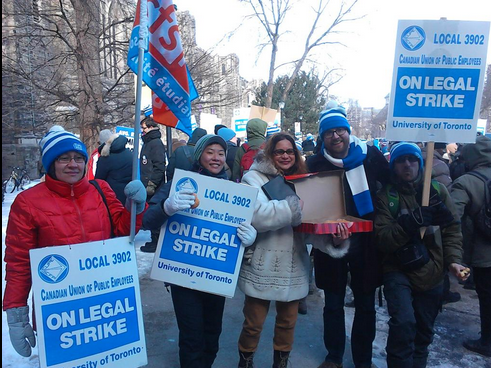Since members of CUPE 3902 went on strike last Friday, there has been very little coverage in the mainstream media that accurately conveys the demands of the striking workers.
CUPE 3902 represents 6,000 teaching assistants (TAs) and graduate course instructors at the University of Toronto. I am a Teaching Assistant in the University’s English Department and thus a member of 3902. I don’t speak for the Union or for all those who are on strike right now. But I do hope to clarify some of the basic issues as I understand them, and as they have been poorly represented across major news outlets.
Yesterday, Provost Cheryl Regehr published an article in the Huffington Post in which she expressed her confusion as to why “some” members of CUPE 3902 voted down a proposed agreement that the University reached with 3902’s bargaining team early in the morning on Friday, February 27. Regehr writes that the Bargaining Team unanimously endorsed this agreement and that it should be put to a vote by the full membership.
The collective agreement we were presented with was time stamped at 2:45 a.m., and states: “Final offer for full and final settlement withdrawn if not accepted unanimously by 3 a.m. on February 27, 2015.”
This means that the Bargaining Team had 15 minutes, in the middle of the night, to decide whether to unanimously endorse this final offer and bring it before the membership. Without unanimous endorsement, the offer would have been withdrawn (we assume) and 3902 would be on strike anyway.
The bargaining team stuck to their word and did not speak against the agreement at the membership meeting. They were, however, strong-armed by the University into accepting this agreement.
In contrast, the bargaining team for CUPE 3903, the local representing TAs at York University, which is likewise on strike right now, moved to reject their employer’s final offer, but were still able to present that offer to their membership at a meeting on Monday night.
The second matter of confusion in the press seems to be about money (which, admittedly, is always a bit confusing).
One Toronto Star article reads that U of T’s TAs make $15,000 a year, or $42.05 an hour. What? Based on a 40-hour workweek $42.05 an hour nets you $88,000 a year.
This is how it works: graduate students at U of T are guaranteed $15,000 a year in income plus tuition (which totalled $8,425 in 2014-2015). Part (but not all) of that funding comes from our TA wages. The rest is filled in by scholarships. While some might argue that graduate funding is not related to TA work, this guaranteed funding level only came into existence after CUPE 3902’s last strike in 2000.
Minimum guarantees vary by department, of course. As a first year PhD student in the English department, I was lucky enough to get external and internal scholarships to fund the first few years of my program. But this is not the case for everyone in my cohort or department, and it is not the case across the university.
All that graduate students are guaranteed is $15,000 per year. And this guarantee only lasts for the first four or five years of your degree, depending your department, whereas in Canada the average time to completion for a humanities PhD is seven years.
Members of 3902 are seeking an increase to this minimum funding package of $15 000 per year, a figure which is over $8,000 lower than the low-income cut off for a single person in the city of Toronto (note that this does not include people with children or other dependents, for whom the low-income cut off is higher). This is why this strike is not just about wages.
If we were to accept the employer’s final offer we would see our hourly wages increase to $43.97 — which, I admit, is a handsome wage, if looked at out of context. But if the minimum guarantee stays the same, then this increase in wages will not make a tangible difference to our living conditions.
Yes, TA work is part-time. But it is part-time work undertaken by full-time students with the understanding that it provide us with job training as academics, and help us pay our bills while we complete our dissertations.
The University requires graduate students in order to maintain its status as a world-class research institution. They have a responsibility to ensure that their graduate students are able to live at a basic minimum standard while carrying out their research and teaching duties.
And the media has a responsibility to learn the facts and report them.
Christina Turner is the former rabble.ca blogs and books intern and a Doctoral Student in English at the University of Toronto. She is a proud member of CUPE 3902.
Image: Twitter/@CBakerCarol




